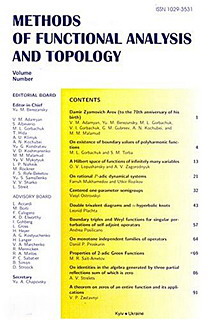H. O. Ibraheem
Search this author in Google Scholar
Quasi-invariance of completely random measures
Habeebat O. Ibraheem, Eugene Lytvynov
MFAT 24 (2018), no. 3, 207-239
207-239
Let $X$ be a locally compact Polish space. Let $\mathbb K(X)$ denote the space of discrete Radon measures on $X$. Let $\mu$ be a completely random discrete measure on $X$, i.e., $\mu$ is (the distribution of) a completely random measure on $X$ that is concentrated on $\mathbb K(X)$. We consider the multiplicative (current) group $C_0(X\to\mathbb R_+)$ consisting of functions on $X$ that take values in $\mathbb R_+=(0,\infty)$ and are equal to 1 outside a compact set. Each element $\theta\in C_0(X\to\mathbb R_+)$ maps $\mathbb K(X)$ onto itself; more precisely, $\theta$ sends a discrete Radon measure $\sum_i s_i\delta_{x_i}$ to $\sum_i \theta(s_i)s_i\delta_{x_i}$. Thus, elements of $C_0(X\to\mathbb R_+)$ transform the weights of discrete Radon measures. We study conditions under which the measure $\mu$ is quasi-invariant under the action of the current group $C_0(X\to\mathbb R_+)$ and consider several classes of examples. We further assume that $X=\mathbb R^d$ and consider the group of local diffeomorphisms $\operatorname{Diff}_0(X)$. Elements of this group also map $\mathbb K(X)$ onto itself. More precisely, a diffeomorphism $\varphi\in \operatorname{Diff}_0(X)$ sends a discrete Radon measure $\sum_i s_i\delta_{x_i}$ to $\sum_i s_i\delta_{\varphi(x_i)}$. Thus, diffeomorphisms from $\operatorname{Diff}_0(X)$ transform the atoms of discrete Radon measures. We study quasi-invariance of $\mu$ under the action of $\operatorname{Diff}_0(X)$. We finally consider the semidirect product $\mathfrak G:=\operatorname{Diff}_0(X)\times C_0(X\to \mathbb R_+)$ and study conditions of quasi-invariance and partial quasi-invariance of $\mu$ under the action of $\mathfrak G$.

